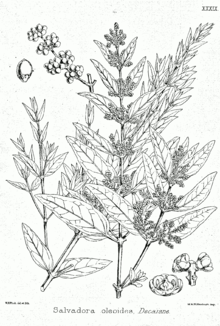Salvadora oleoides
This article needs additional citations for verification. (November 2019) |
| Salvadora oleoides | |
|---|---|

| |
| Scientific classification | |
| Kingdom: | Plantae |
| Clade: | Tracheophytes |
| Clade: | Angiosperms |
| Clade: | Eudicots |
| Clade: | Rosids |
| Order: | Brassicales |
| Family: | Salvadoraceae |
| Genus: | Salvadora |
| Species: | S. oleoides
|
| Binomial name | |
| Salvadora oleoides Decne.[1]
| |
Salvadora oleoides is a small bushy evergreen tree found in India and Pakistan and southern Iran.
The root and stem possess various antimicrobial agents and is traditionally used as toothbrush in Pakistan and India. [1]
Habitat[]
The vann is commonly found in and around Sandal Bar, and is reserved for use as grazing sources for local peasant villages. In addition, a number of trees have been preserved to provide shade for cattle.
Wood[]
The vann is mostly non-woody and the small amount of wood that it has is soft, light, and not particularly useful for any of wood's normal uses, notably building and heat. When burnt, it leaves a large quantity of ash, which can then be boiled down into a substance for treating mange in camels.
In literature[]
Jal-tree[]
In the janamsakhis of Guru Nanak, he was found laying under a jal-tree whose shadow remained stationary to protect him from the sun. Macauliffe identifies this tree as Salvadora oleoides.[2]
See also[]
- "Pilu"[2] is a Proto Dravidian word named after tooth word "Pal" for indicating tooth word
- Pīlu - Mentioned in Mahābhārata.
- Salvadora persica—Toothbrush tree, peelu, or siwak
References[]
| Wikispecies has information related to Salvadora oleoides. |
| Wikimedia Commons has media related to Salvadora oleoides. |
- ^ "Salvadora oleoides". Germplasm Resources Information Network (GRIN). Agricultural Research Service (ARS), United States Department of Agriculture (USDA). Retrieved 2010-08-21.
- ^ Macauliffe, Max Arthur (1909). The Sikh Religion, its gurus, sacred writings and authors. Oxford: Oxford University Press. p. .
- RN Kaul (1963): Need for afforestation in the arid zones of India, LA-YAARAN, Vol 13
- RC Ghosh (1977): Hand book on afforestation techniques, Dehradun.
- RK Gupta & Ishwar Prakasah (1975): Environmental analysis of the Thar Desert, Dehradun.
- Salvadoraceae
- Flora of India (region)
- Flora of Pakistan
- Flora of Iran
